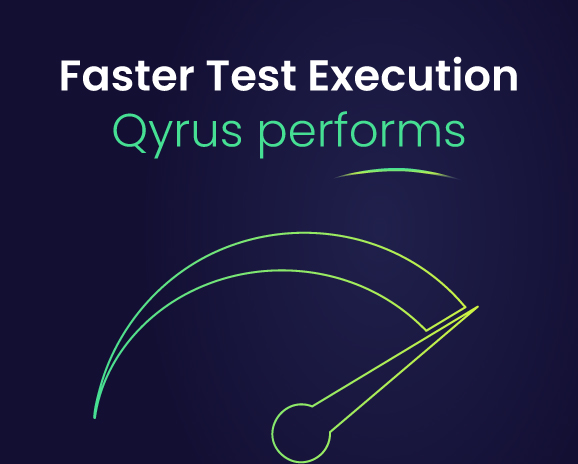Feature Friday: Unlock Effortless Integration with AI-Powered Test Converter

Dive into the magic of effortless test integration with Qyrus’ AI-powered test converter! Picture this: Ananya spills the beans on Qyrus, where importing scripts is as breezy as a stroll in the park—no need to endure the painstaking task of rebuilding extensive test suites. Tim chips in to cheerlead this digital superhero, especially for those script-wranglers dealing with a multitude of codes. Say goodbye to script-creating marathons; Qyrus is here to save the day, potentially freeing up hours, or even days, of your precious time!
Tell us more about Qyrus’ AI-powered test converter and what it can do.
Ananya:
Qyrus allows users to take scripts that they have created outside of Qyrus, convert them, and upload them directly into Qyrus. This allows users to not have to recreate the same tests again from scratch and eliminates the tedious work that comes with it.
Tim:
This targets users who may have been using other methods of testing applications. Especially if a user has many and/or long scripts, one could save hours, even days, or tedious work trying to get their working tests integrated into Qyrus.
Discover the transformative impact of the test converter on the testing process. Ananya emphasizes a paradigm shift in the test-building phase. Instead of starting anew, users can convert existing Selenium scripts seamlessly into Qyrus-compatible ones, preserving their hard work while adopting an enhanced testing approach.
What is the test converter’s overall impact on the testing process?
Ananya:
The converter introduces a significant shift, particularly in the test-building phase of the process. Instead of requiring users to start from scratch and recreate their scripts, they now have the valuable capability to convert their already existing scripts into Qyrus-compatible ones. This addresses a common concern we’ve encountered in the past – the dilemma of leveraging existing Selenium scripts that are already in use. It’s a practical solution that allows users to preserve their hard work while adopting a new and improved approach.
Can you elaborate on the compatibility of the test converter with different open-source tools?
Tim:
Absolutely. The converter extends its reach to all open-source tools whose code is written in popular languages like JS, TS, Java, C#, and Python. This broad compatibility ensures that users working with a diverse range of open-source testing tools can seamlessly transition and utilize Qyrus, adding a layer of versatility to the testing process.
How might these test converters help testers, developers, and business technologists? What value can this feature bring?
Ananya:
This tool is primarily aimed at testers, offering a significant advantage in terms of efficiency and reusability. Testers no longer find themselves repeating the laborious task of recreating scripts that were previously built on other open-source tools. With the Qyrus Test Converter, testers simply upload their existing test scripts, and the converter seamlessly handles the code translation, generating a JSON file for the user. Subsequently, the user can effortlessly upload the file into any test in Qyrus, and the steps will automatically appear, streamlining the entire process.
Tim:
Business technologists stand to greatly benefit from this feature as well. While Qyrus prides itself on being a no-code and low-code platform with user-friendly features for building test scenarios, some business technologists may lack the technical expertise to handle more advanced test scripts. With the converter, a technologist can easily convert and upload tests. From there, they can verify if the tests meet all the set criteria without grappling with complex technical details. This accessibility extends to developers as well, providing a user-friendly bridge for those more technically inclined.
Does the same or similar functionality exist without Qyrus, and how do competitors address similar problems?
Ananya:
While some competitors do offer resources to assist in integrating previous tests onto their platforms, not all provide the convenience of an automated test converter. Qyrus stands out by offering a dedicated test converter, streamlining the process of building the bulk of scripts. Moreover, if any adjustments are required, the Qyrus team is readily available to provide support in editing these tests, ensuring a seamless transition.
Can you elaborate on the benefits of having a test converter, especially in comparison to other testing tools?
Tim:
Opting for a more conventional approach, without the aid of testing tools, leaves a tester with limited options. They might find themselves subscribing to a tool that lacks the essential feature of a test converter, leading to inefficiencies and additional challenges. Alternatively, they could persist with building automated or manual tests manually, a time-consuming endeavor that demands substantial resources. Qyrus’ test converter not only offers a more efficient and automated solution but also presents a cost-effective and time-saving alternative, contributing to the overall benefits of translation in the testing process.
Delve into the benefits of the Qyrus test converter compared to conventional testing approaches. Tim explains how the test converter provides an efficient, automated, and cost-effective solution, saving time and resources. It eliminates the limitations faced by testers subscribing to tools lacking a test converter and those manually building tests, presenting a smarter alternative for testing processes.
How do you see the test converter impacting day-to-day operations across organizations?
Ananya:
The impact of the test converter on day-to-day operations is quite substantial. Not only does it eliminate the cumbersome task of rebuilding scripts from scratch, but it also opens up opportunities for users to build upon these scripts using the clone script method in Qyrus. This streamlined approach simplifies the testing process, allowing users to focus on refining their tests rather than investing time in recreating them.
Tim:
The test converter significantly contributes to saving effort and optimizing testing operations within organizations. It eliminates the need for duplicating tests created on legacy platforms, enabling users to seamlessly transition and leverage the unique features of the Qyrus platform. This not only enhances efficiency but also provides the freedom to think of smarter ways to test applications, rather than being tied down to the repetitive task of script building. The ability to upload a script and then clone it as many times as needed, building different scenarios based on the previous script using Qyrus’ clone script method, further exemplifies the benefits of translation in testing processes.
What kind of updates might we expect to the test converter in the future?
Ananya:
The Qyrus test converter has been tailored to cater to users from both automated and manual testing backgrounds, making significant strides in code translation. Currently, it supports the conversion of manual codebases, including GDD, Gherkins, and Glue, as well as those from Selenium. Building upon this foundation, we recently introduced the capability to convert individual tests and POM-based tests using the test converter. Looking ahead, Qyrus aims to further expand the range of supported test types, providing users with even more options for seamless code translation.
Experience a testing revolution with Qyrus’ test converter—an innovative tool designed to streamline integration, enhance efficiency, and unlock new possibilities in the dynamic field of test automation. As Qyrus evolves, so does its commitment to providing users with cutting-edge solutions, making the testing process more accessible and effective.






